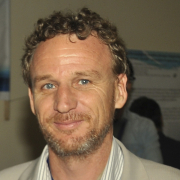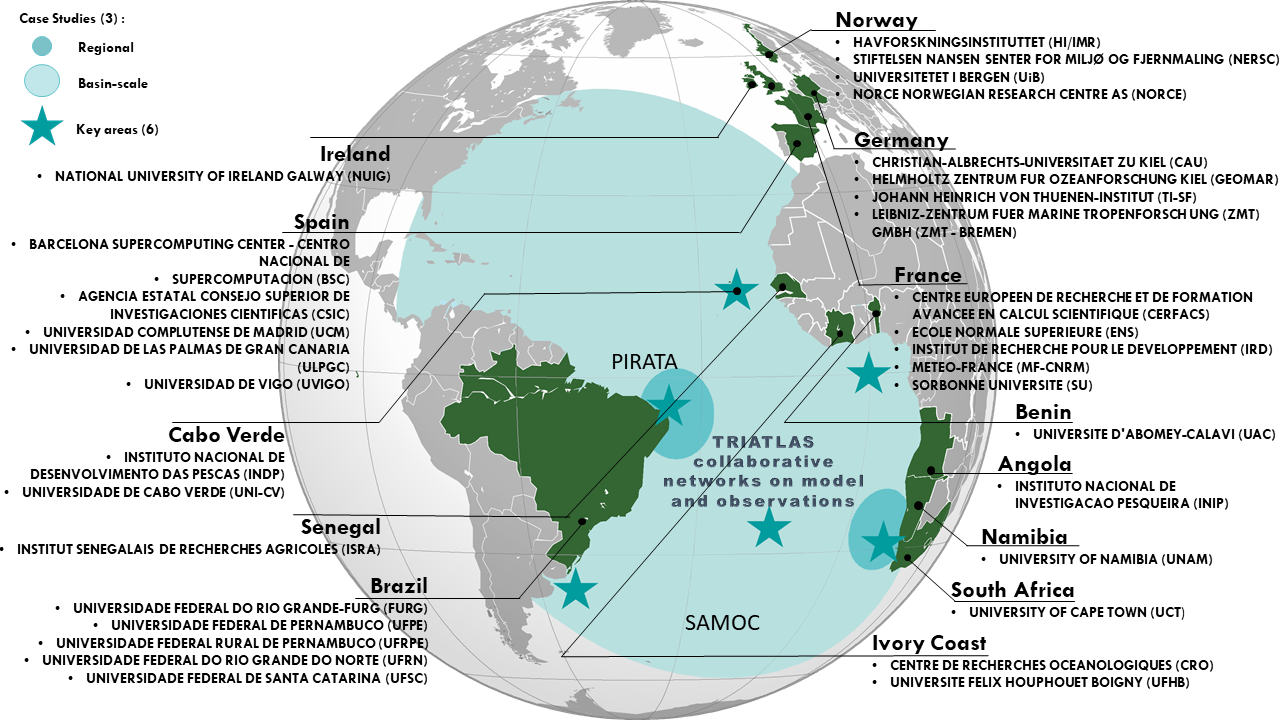
Copyright : Laboratoire LEMAR- 2018
 Gaps in our understanding of marine ecosystems and their future changes pose a major challenge for the sustainable management of human activities affecting them. Our knowledge of the status of the South and Tropical Atlantic marine ecosystems and their future evolution is particularly poor, especially in comparison to the North Atlantic.
At the same time, many of the countries bordering the South and Tropical Atlantic depend heavily on marine ecosystems for providing relevant services such as food, genetic resources, recreation and climate regulation. Thus there is an urgent need to provide reliable information on their current state and how they may change over the next few months to decades, which are the time scales of greatest and immediate interest to most stakeholders and economic actors. Research is now needed on understanding and modelling climatic and human activity impacts on marine ecosystems in the South and Tropical Atlantic, to be able to understand, predict and adapt to ecosystem changes. A systemic approach, leading to climate based ecosystem prediction and information on future socio-economic and ecosystem service changes, will enable policy makers to tackle socio-economic challenges and contribute to the sustainable development of the region.
Gaps in our understanding of marine ecosystems and their future changes pose a major challenge for the sustainable management of human activities affecting them. Our knowledge of the status of the South and Tropical Atlantic marine ecosystems and their future evolution is particularly poor, especially in comparison to the North Atlantic.
At the same time, many of the countries bordering the South and Tropical Atlantic depend heavily on marine ecosystems for providing relevant services such as food, genetic resources, recreation and climate regulation. Thus there is an urgent need to provide reliable information on their current state and how they may change over the next few months to decades, which are the time scales of greatest and immediate interest to most stakeholders and economic actors. Research is now needed on understanding and modelling climatic and human activity impacts on marine ecosystems in the South and Tropical Atlantic, to be able to understand, predict and adapt to ecosystem changes. A systemic approach, leading to climate based ecosystem prediction and information on future socio-economic and ecosystem service changes, will enable policy makers to tackle socio-economic challenges and contribute to the sustainable development of the region.
Universitetet i Bergen (UiB) – Bergen, Norway, Helmholtz zentrum für Ozeanforschung Kiel (GEOMAR) – Kiel, Germany, Stiftelsen Nansen Senter for miljø og fjernmåling (NERSC) – Bergen, Norway, Havforskningsinstituttet (HI) – Bergen, Norway, Johann Heinrich von Thünen-Institut, Bundesforschungsinstitut für Ländliche Räume, Wald und Fischerei (TI-SF) – Braunschweig, Germany, Leibniz-Zentrum für Marine Tropenforschung (ZMT) – Bremen, Germany, Christian-Albrechts-Universität zu Kiel (CAU) – Kiel, Germany, Meteo-France (M-F) – Paris, France, Centre Européen de Recherche et de Formation Avancée en Calcul Scientifique (CERFACS) – Toulouse, France, Institut de recherche pour le développement (IRD) – Marseille, France, The Barcelona Supercomputing Center (discover) – Centro Nacional de Supercomputación – Barcelona, Spain, Universidad Complutense de Madrid (UCM) – Madrid, Spain, University of Cape Town (UCT) – Cape Town, South Africa ; Instituto Nacional de Desenvolvimento das Pescas (INDP) – San Vicente, Cabo Verde, Instituto Nacional de Investigação Pesqueira (INIP) – Luanda, Angola, Universidad de Vigo (UVIGO) – Vigo, Spain, Universidad de Las Palmas de Gran Canaria (ULPGC) – Las Palmas de Gran Canaria, Spain, Université Félix Houphouët-Boigny (UFHB) – Abidjan, Cote d’Ivoire ; Centre de recherches océanologiques (CRO) – Abidjan, Cote d’Ivoire ; Universite D’Abomey-Calavi (UAC) – Cotonou, Benin ; Universidade Federal do Rio Grande (FURG) – Rio Grande, Brazil ; Universidade Federal de Pernambuco (UFPE) – Recife, Brazil ; Universidade Federal de Santa Catarina (UFSC) – Florianoppolis, Brazil ; Universidade Federal Rural de Pernambuco (UFRPE) – Recife, Brazil ; National University of Ireland Galway (NUI GALWAY) – Galway, Ireland ; NORCE Norwegian Research Centre AS (NORCE) – Bergen, Norway ; Institut Sénégalais de Recherches Agricoles (ISRA) – Dakar, Senegal ; Agencia Consejo Superior de Investigaciones Científicas (CSIC) – Madrid, Spain ; École normale supérieure (ENS) – Paris, France ; Universidade de Cabo Verde (UNI-CV) – Praia, Cabo Verde ; Universidade Federal do Rio Grande do Norte (UFRN) – Natal, Brazil ; Sorbonne Université (SU) – Paris, France ; University of Namibia (UNAM) – Windhoek, Namibia

 PPP : Preventing Plastic Pollution
Scroll to top
PPP : Preventing Plastic Pollution
Scroll to top